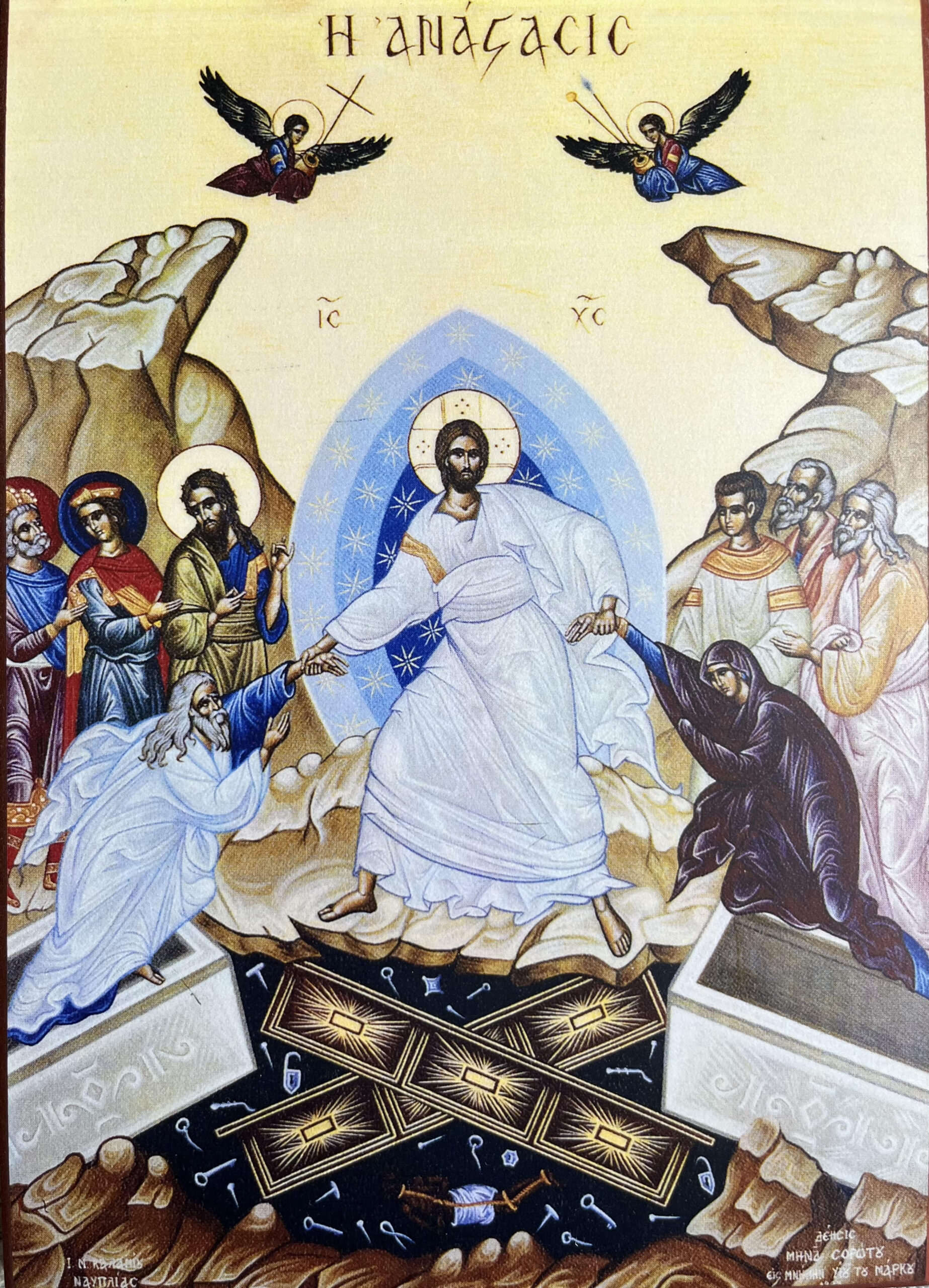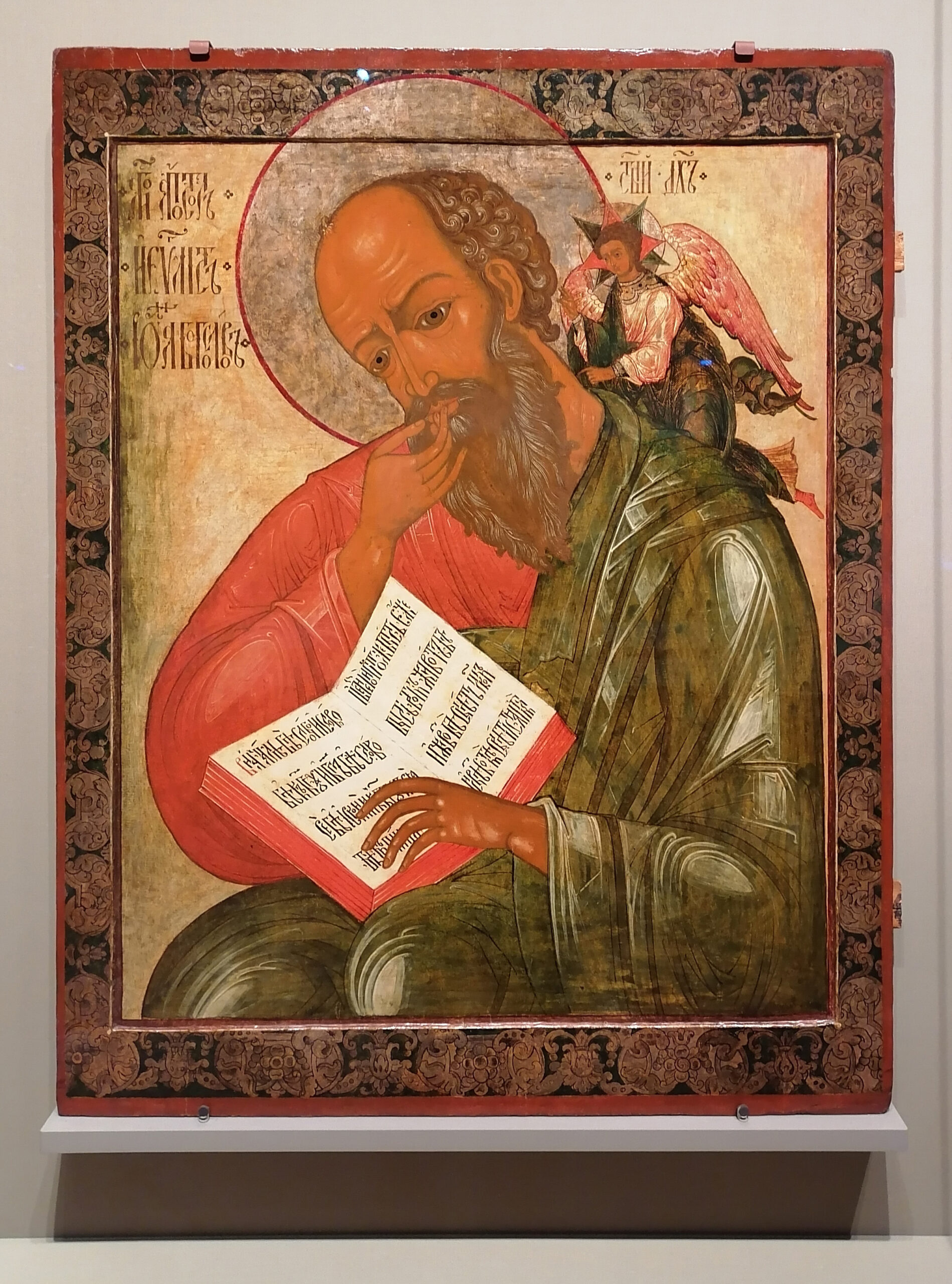Because of a tree, Adam was estranged from Paradise; because of the wood of the Cross, the thief abode in Paradise; for the former, in tasting, disobeyed the commandment of the Creator; but the latter, who was crucified with You, confessed, admitting to You the concealed God. O Savior; remember us also, in Your Kingdom.
Your life-bearing side, O Christ, overflows like a spring from Eden, watering Your Church, and making it a living Paradise; then dividing the glad tidings into four Gospels, as headwaters, it irrigates the world, gladdening creation, and teaching the Gentiles to adore Your Kingdom in faith.
~Beatitudes, 12 Gospels, Holy Thursday Evening, Trans. by Fr. George Papadeas
—
A river flowed out of Eden to water the garden, and there it divided and became four rivers. The name of the first is Pishon; it is the one which flows around the whole land of Havilah, where there is gold; and the gold of that land is good; bdellium and onyx stone are there. The name of the second river is Gihon; it is the one which flows around the whole land of Cush. And the name of the third river is Tigris, which flows east of Assyria. And the fourth river is the Euphrates.
Genesis 2:10-14
Why did Jesus need to die on the cross? This is a very foundational existential question we need to ask as Christians. Because Christ dying for our sins is critical to our identity, purpose, and life as Christians. This question is answered in part by the hymns of Holy Thursday evening, which have their basis in Scripture. Let’s begin.
God created the world. Did He create it perfect, or less than perfect? God, by His definition, is perfect. So, what He creates is perfect. Only fallen creatures create what is less than perfect. The human beings God created were also perfect. We were created to be perfect. We were created in order to share in the love and the perfection of God.
God made man in His image and likeness. While we are not God, we were created to be like God. So, if you were to create a math equation showing man on one side and God on the other, the equation would be balanced.
When God created man and woman and placed them in the garden of Eden (Paradise), He gave them the freedom to control everything. He also gave them freedom to love Him and to stay with Him. Love is not about coercion or control. So, the Lord told them that there was one tree in the garden from which they could not eat, the tree of the knowledge of good and evil. He told them that if they ate from that tree, they would die.
The Fall is recounted in Genesis 3:1-12, where we read:
Now the serpent was more subtle than any other wild creature that the Lord God had made. He said to the woman, “Did God say, ‘You shall not eat of any tree of the garden’?” And the woman said to the serpent, “We may eat of the fruit of the trees of the garden; but God said, ‘You shall not eat of the fruit of the tree which is in the midst of the garden, neither shall you touch it, lest you die.’” But the serpent said to the woman, “You will not die. For God knows that when you eat of it your eyes will be opened, and you will be like God, knowing good and evil.” So when the woman saw that the tree was good for food, and that it was a delight to the eyes, and that the tree was to be desired to make one wise, she took of its fruit and ate; and she also gave some to her husband, and he ate. Then the eyes of both were opened, and they knew that they were naked; and they sewed fig leaves together and made themselves aprons. And they heard the sound of the Lord God walking in the garden in the cool of the day, and the man and his wife hid themselves from the presence of the Lord God among the trees of the garden. But the Lord God called to the man, and said to him, “Where are you?” And he said, “I heard the sound of thee in the garden, and I was afraid, because I was naked; and I hid myself.” He said, “Who told you that you were naked? Have you eaten of the tree of which I commanded you not to eat?” The man said, “The woman whom thou gavest to be with me, she gave me fruit of the tree, and I ate.”
The consequences of the fall are enumerated in Genesis 3:14-19. There would be enmity between man and woman (verse 15), pain in childbearing (verse 16), toil to get the ground to produce food (verse 17) and ultimately death (verse 19). Even worse than this was the banishment from Paradise (verse 22-24).
All of these negative things entered on man’s side of the equation. The solution to this problem of an unbalanced equation between God and man was for God to incarnate the Word of God, into the man we called Jesus, who is the Christ, the promised Messiah. He came into the world as a human being and experienced what it is to be a human being. He got tired, hungry, sick, cold, lonely, afraid, all the things we experience. However, He didn’t sin in His experience of our humanity. At every fork in the road where a human being is tempted to stray from God, He did not. When Jesus died on the cross, He uttered the words “It is finished.” (John 19:30) And as He bowed His head and gave up His spirit, the equation was balanced, because now He had experienced the death of a human being, the greatest consequence of the Fall of Adam.
Three days later, Jesus rose from the dead, and later ascended into heaven and sat down at the right hand of the Father. The equation again is unbalanced. We are called to follow in the footsteps of Christ in our lives, so that when we are about to die, we can say the words “Into Your hands I commit my spirit,” (Luke 23:46) and we will really mean that. And subsequently, we will be deemed worthy to rise from the dead and sit at the right hand of the Father, again in Paradise, from which there will not be another Fall.
In this reflection, we examine two hymns from Holy Thursday evening. This section of the service is called “The Beatitudes,” because in between each hymn, a verse of the Beatitudes is sung. (The hymns themselves are not the Beatitudes.) The first hymn we have shared talks about how Adam was estranged from Paradise because of a tree, because he partook of the fruit of the tree. Christ hung on the tree (the cross) and because of this, the thief gained Paradise. The message here: we were condemned because of a tree. And we are saved because of a tree.
The second hymn refers to the side of Christ that was pierced with a lance and how it became like a spring in Eden, and how the four Gospels are like the four most ancient rivers, in that they offer spiritual irrigation to the world, in the same manner in which the Pishon, Gihon, Tigris and Euphrates Rivers irrigated the fertile crescent, the place in the ancient world where there was life.
The prayer that will accompany this reflection is the Beatitudes themselves, that are found in the Gospel of Matthew, prescriptions for how we should be living on a daily basis.
“Blessed are the poor in spirit, for theirs is the kingdom of heaven.
“Blessed are those who mourn, for they shall be comforted.
“Blessed are the meek, for they shall inherit the earth.
“Blessed are those who hunger and thirst for righteousness, for they shall be satisfied.
“Blessed are the merciful, for they shall obtain mercy.
“Blessed are the pure in heart, for they shall see God.
“Blessed are the peacemakers, for they shall be called sons of God.
“Blessed are those who are persecuted for righteousness’ sake, for theirs is the kingdom of heaven.
“Blessed are you when men revile you and persecute you and utter all kinds of evil against you falsely on my account. Rejoice and be glad, for your reward is great in heaven
Matthew 5: 1-12
(Also in the 12 Gospels, Holy Thursday Evening, Trans. by Fr. George Papadeas)
We know from our school days in algebra class that an equation is balanced when we do the same thing to both sides. Christ endured all the things that a human being endures, as well as hanging on the tree, to overcome and balance the equation that had become unbalanced at the time of the Fall. The Fall was caused when mankind ate from a forbidden tree. Salvation was assured because Christ hung on a tree.

